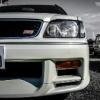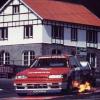Roll Centre
Announcements
-
Similar Content
-
Latest Posts
-
If that was the case I suppose you could call it "Mein's" brand.... ... I'll see myself out... 😅
-
with the car running (runs fine when temp is cold), I unplugged the MAF and the car stalled. I have already cleaned it a week ago. I unplugged the O2 sensor from the left side of the vehicle, and the car was still running. I let it idle for about 5-7 minutes and shut it off, to see if it would restart, and it did not. It cranks but doesn't start after engine temp gets up to normal range. I still need to look at the coolant temp sensor, is this one at the top or bottom of the radiator? Or is it one of the sensor threaded into the T-stat housing?
-
fair call about sau.com.au really, only the pics give it away
-





.thumb.JPG.cf2120a7648a369e8c7c30f420c0479a.JPG)



Recommended Posts
Create an account or sign in to comment
You need to be a member in order to leave a comment
Create an account
Sign up for a new account in our community. It's easy!
Register a new accountSign in
Already have an account? Sign in here.
Sign In Now